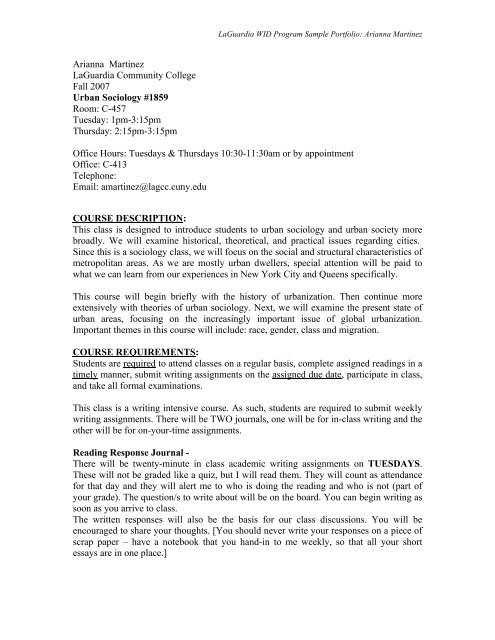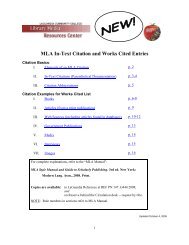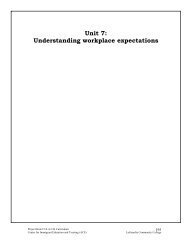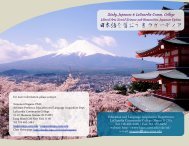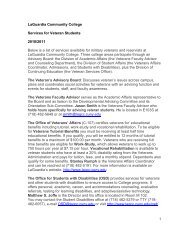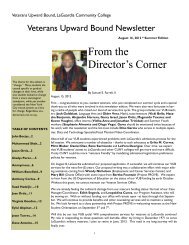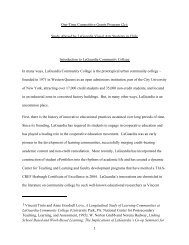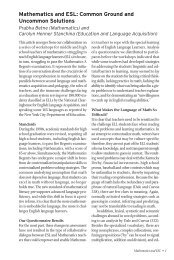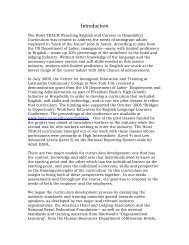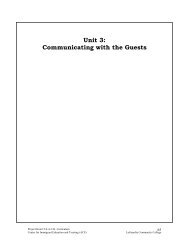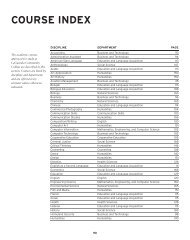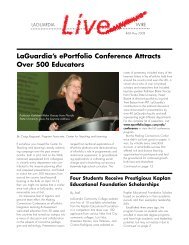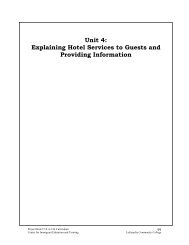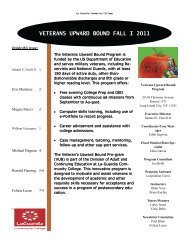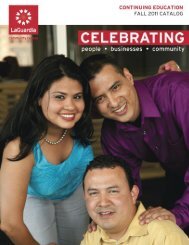Urban Sociology Pre-WID (PDF) - LaGuardia Community College
Urban Sociology Pre-WID (PDF) - LaGuardia Community College
Urban Sociology Pre-WID (PDF) - LaGuardia Community College
You also want an ePaper? Increase the reach of your titles
YUMPU automatically turns print PDFs into web optimized ePapers that Google loves.
<strong>LaGuardia</strong> <strong>WID</strong> Program Sample Portfolio: Arianna Martinez<br />
Arianna Martinez<br />
<strong>LaGuardia</strong> <strong>Community</strong> <strong>College</strong><br />
Fall 2007<br />
<strong>Urban</strong> <strong>Sociology</strong> #1859<br />
Room: C-457<br />
Tuesday: 1pm-3:15pm<br />
Thursday: 2:15pm-3:15pm<br />
Office Hours: Tuesdays & Thursdays 10:30-11:30am or by appointment<br />
Office: C-413<br />
Telephone:<br />
Email: amartinez@lagcc.cuny.edu<br />
COURSE DESCRIPTION:<br />
This class is designed to introduce students to urban sociology and urban society more<br />
broadly. We will examine historical, theoretical, and practical issues regarding cities.<br />
Since this is a sociology class, we will focus on the social and structural characteristics of<br />
metropolitan areas. As we are mostly urban dwellers, special attention will be paid to<br />
what we can learn from our experiences in New York City and Queens specifically.<br />
This course will begin briefly with the history of urbanization. Then continue more<br />
extensively with theories of urban sociology. Next, we will examine the present state of<br />
urban areas, focusing on the increasingly important issue of global urbanization.<br />
Important themes in this course will include: race, gender, class and migration.<br />
COURSE REQUIREMENTS:<br />
Students are required to attend classes on a regular basis, complete assigned readings in a<br />
timely manner, submit writing assignments on the assigned due date, participate in class,<br />
and take all formal examinations.<br />
This class is a writing intensive course. As such, students are required to submit weekly<br />
writing assignments. There will be TWO journals, one will be for in-class writing and the<br />
other will be for on-your-time assignments.<br />
Reading Response Journal -<br />
There will be twenty-minute in class academic writing assignments on TUESDAYS.<br />
These will not be graded like a quiz, but I will read them. They will count as attendance<br />
for that day and they will alert me to who is doing the reading and who is not (part of<br />
your grade). The question/s to write about will be on the board. You can begin writing as<br />
soon as you arrive to class.<br />
The written responses will also be the basis for our class discussions. You will be<br />
encouraged to share your thoughts. [You should never write your responses on a piece of<br />
scrap paper – have a notebook that you hand-in to me weekly, so that all your short<br />
essays are in one place.]
<strong>LaGuardia</strong> <strong>WID</strong> Program Sample Portfolio: Arianna Martinez<br />
<strong>Urban</strong> Observation Journal -<br />
There will also be at home writing assignments each week. These assignments will be<br />
creative and hopefully fun. We will discuss and share them on THURSDAYS. These<br />
will be graded with a letter grade.<br />
The <strong>Urban</strong> Observation Journal will, like its title implies, be a collection of urban<br />
observations focusing on one New York City neighborhood that you are intimately<br />
acquainted with (where you live now, where you grew up, where you spend all your freetime).<br />
We will use multiple mediums (writing, photography, etc) to explore this place and<br />
by the end of the semester we will incorporate the entire class’ research into an<br />
interactive map (most likely Google map).<br />
<strong>Urban</strong> Observation Journal Writing Assignments<br />
1. Use a disposable camera OR digital camera to take a minimum of 10 photographs.<br />
They should all be of ONE neighborhood you intend to focus on for the duration<br />
of the semester. Burn them onto a CD and bring them to class. Write about ONE<br />
of the photographs, what it represents to you, why it is important to you, where it<br />
is, & what your connection to this location is.<br />
2. Write about your neighborhood in the style of Jane Jacobs. Is it safe? If so why?<br />
Do people walk on the sidewalks or drive mostly? Do kids play in the street? Is it<br />
mostly residential or are there businesses and busy blocks? Does it have diverse<br />
uses? What are the uses? Is there a diversity of people living there? Who and from<br />
where?<br />
3. Write about a public space in the style of William Whyte. Sit in a public space<br />
that is in the neighborhood you have been exploring. Write about how and why it<br />
is a public space. Who is using this space? What are they doing – talking on cell<br />
phones, eating lunch, jogging, playing with their kids in the park? Then write<br />
about what you like or what you hate about it. Are there recommendations you<br />
have thought of on how to make it a better public space?<br />
4. Pick an issue that is important in this neighborhood – gentrification, immigration,<br />
food security, unemployment, transportation, some new urban development<br />
project, etc. Write about how this issue is impacting the neighborhood.<br />
5. Find your neighborhood on Google Earth. Find your neighborhood on Google<br />
Map. Write about how these digital maps of your neighborhood are similar and<br />
different. What were you able to see on these maps (restaurants, roads, parks,<br />
etc)? Did either map make you think about your place in a new way? If so how?<br />
Is there something about your neighborhood that you love that isn’t represented?<br />
If so what? Could you see your house, your favorite park, shoe store, etc? What<br />
kinds of informational layers exist for your area and what if anything did you<br />
learn from them?<br />
6. Interview someone who has been living in or working in this neighborhood for<br />
many years (an immigrant, African American and/or women). Come up with your<br />
questions in advance! Ask them questions like: when and why they ended up in<br />
the neighborhood? What they like about it? How has the neighborhood changed?<br />
Did they like it better before or now and why? Write a written summary of your<br />
interview with them, but also attach the raw interview.
<strong>LaGuardia</strong> <strong>WID</strong> Program Sample Portfolio: Arianna Martinez<br />
7. Find census data from last 20 years and analyze it, write a journalism type piece<br />
about the neighborhood changes. What was the population of your neighborhood<br />
in 1980 and compare that to 2000. What was the ethnic and racial make-up of this<br />
community in 1980 and how has it changed? Find other dramatic changes in the<br />
data and discuss them.<br />
8. Find an interesting venue within your neighborhood either public art piece, unique<br />
store, museum, library, farmers market, etc that is important to the neighborhood.<br />
Review it like a travel guide.<br />
NOTE: You are allowed to miss ONE - it cannot be assignment #1 or assignment #4.<br />
Also, please be sure to save and store all out-of-class writing assignments electronically.<br />
MIDTERM EXAM:<br />
There will be an in-class midterm exam, which will be open note, but ONLY from your<br />
Reading Response Journal. It will help you answer the questions if you have done the<br />
readings throughout the semester and written thoughtfully. Not sure about the final exam<br />
yet – I’ll get back to you on that.<br />
FINAL RESEARCH PAPER:<br />
Submit a 8-page research project on one neighborhood in New York City and an issue<br />
that is impacting the neighborhood.<br />
The 8-page research project should adhere to the following guidelines: 1) include a cover<br />
page; 2) format with double spacing and one inch margins; 3) footnotes and citations<br />
should follow an acceptable style format; 4) include a bibliography with a minimum of 8<br />
entries (books and articles) and four LEXIS/NEXIS sources - for a total of 12 entries. The<br />
8-page minimum is linked to the actual essay and does not include the cover page or the<br />
bibliography.<br />
The criteria for approaching and organizing the research paper will be fully discussed in<br />
class. Each <strong>Urban</strong> Observation Journal entry will be useful for the final paper, but<br />
assignment #4 will be the origins of your research paper. Whichever issue you<br />
choose to write about in an exploratory manner, will then be researched fully and<br />
developed into a research paper.<br />
NOTE: Students are highly encouraged to discuss their research project with the<br />
instructor during regularly scheduled office hours and students experiencing problems in<br />
their writing should make an appointment with the <strong>LaGuardia</strong> Writing Center.<br />
FIELD TRIPS:<br />
There will be two field trips. Stay tuned for more information about these. The<br />
instructions associated with the fieldtrips will be distributed and discussed prior to the<br />
field trips. If a given student cannot attend because of employment responsibilities,<br />
religious reasons, or family obligations please speak with the instructor.
<strong>LaGuardia</strong> <strong>WID</strong> Program Sample Portfolio: Arianna Martinez<br />
GRADING:<br />
The final grade will be based on: Mid-term Exam (20%); Final Research Paper & Map<br />
(30%); Reading Response Journal (25%); and the <strong>Urban</strong> Observation Journal (25%).<br />
LIBRARY TOUR:<br />
Early in the academic semester students will be required to participate in a formal tour of<br />
the <strong>LaGuardia</strong> Library. The library tour will provide an overview of the academic<br />
resources available to students as they structure, research, and craft their high-stakes<br />
research project and weekly writing assignments.<br />
REQUIRED TEXT AND COURSE READINGS:<br />
The textbook will serve as the general frame of reference for the course. The required text<br />
is:<br />
• Nancy Kleniewski. (2006). Cities, Change & Conflict, Belmont, CA: Thomson<br />
Higher Education. Third Edition. {Text will be on reserve in the library)<br />
Throughout the course of the semester I will also assign short excerpts from great urban<br />
thinkers and/or newspaper articles addressing contemporary urban issues. Below on the<br />
“Course Schedule” you will notice some readings with an * next to them, this means they<br />
are available on ERES. Articles I assign in class that are not currently listed will also be<br />
available on ERES (but may also be accessible via the New York Times website OR<br />
using the LEXIS/NEXIS database, which is available via the <strong>LaGuardia</strong> Library<br />
electronic homepage.<br />
CLASS SCHEDULE:<br />
Week One<br />
Tues. Sept. 11, 2007<br />
Thurs. Sept. 13, 2007<br />
HOMEWORK<br />
Week Two<br />
Tues. Sept. 18, 2007<br />
Thurs. Sept. 20<br />
HOMEWORK<br />
Introduction to class & TimeOutNY article<br />
NO CLASS<br />
Jane Jacobs Reading*<br />
William Whyte Reading*<br />
<strong>Urban</strong> Observation Assignment #1<br />
Classes follow Thursday schedule!<br />
Discuss <strong>Urban</strong> Observation #1<br />
When the Levees Broke (documentary film)<br />
Examining <strong>Urban</strong> Issues<br />
Theoretical Perspectives<br />
Cities in World History<br />
<strong>Urban</strong> Observation Assignment #2<br />
Week Three<br />
Tues. Sept. 25<br />
Readings & In-class writing<br />
Thurs. Sept. 27 Discuss <strong>Urban</strong> Observation #2
<strong>LaGuardia</strong> <strong>WID</strong> Program Sample Portfolio: Arianna Martinez<br />
HOMEWORK<br />
<strong>Urban</strong> Development in the United States<br />
Cities, Suburbs and Metropolitan Areas<br />
Herbert J. Gans Reading*<br />
<strong>Urban</strong> Observation Assignment #3<br />
Week Four<br />
Tues. Oct. 2<br />
Readings & In-class writing<br />
Thurs. Oct. 4 <strong>Urban</strong> Observation #3<br />
HOMEWORK<br />
Cities in Europe<br />
Cities in the Third World<br />
Shadow Cities chapter*<br />
<strong>Urban</strong> Observation Assignment #4<br />
Week Five<br />
Tues. Oct. 9<br />
Readings & In-class writing<br />
Thurs. Oct. 11 <strong>Urban</strong> Observation #4<br />
HOMEWORK<br />
Immigrants in the City<br />
New York Times Magazine Article on Latinos*<br />
<strong>Urban</strong> Observation Assignment #5<br />
Week Six<br />
Tues. Oct. 16<br />
MIDTERM in-class<br />
Thurs. Oct. 18 <strong>Urban</strong> Observation #5<br />
HOMEWORK<br />
African Americans in Cities<br />
W.E.B. Dubois Reading*<br />
<strong>Urban</strong> Observation Assignment #6<br />
Week Seven<br />
Tues. Oct. 23<br />
Readings & In-class writing<br />
Thurs. Oct. 25 <strong>Urban</strong> Observation #6<br />
HOMEWORK<br />
Social Class and Neighborhoods<br />
Saskia Sassen Reading*<br />
<strong>Urban</strong> Observation Assignment #7<br />
Week Eight<br />
Tues. Oct. 30<br />
Readings & In-class writing<br />
Thurs. Nov. 1 <strong>Urban</strong> Observation #7<br />
HOMEWORK<br />
Women in Cities<br />
Dolores Hayden*<br />
<strong>Urban</strong> Observation Assignment #8<br />
Week Nine<br />
Tues. Nov. 6<br />
Readings & In-class writing<br />
Thurs. Nov. 8 <strong>Urban</strong> Observation #8
<strong>LaGuardia</strong> <strong>WID</strong> Program Sample Portfolio: Arianna Martinez<br />
HOMEWORK<br />
Week Ten<br />
Tues. Nov. 13<br />
Thurs. Nov. 15<br />
HOMEWORK<br />
Week Eleven<br />
Tues. Nov. 20<br />
Thurs. Nov. 22<br />
HOMEWORK<br />
Week Twelve<br />
Tues. Nov. 27<br />
Thurs. Nov. 29<br />
HOMEWORK<br />
Week Thirteen<br />
Tues. Dec. 4<br />
Thurs. Dec. 6<br />
HOMEWORK<br />
Week Fourteen<br />
The <strong>Urban</strong> Economy<br />
Local Government and Finances<br />
Federal Policy<br />
Readings & Writing<br />
COMPUTER LAB to work on MAPS<br />
<strong>Urban</strong> Unrest and Social Control<br />
Planning for the Future of Cities<br />
Mike Davis Reading about LA*<br />
Readings & Writing<br />
NO CLASS<br />
Research paper<br />
Field Trip<br />
COMPUTER LAB to work on MAPS<br />
Research paper<br />
Readings & Writing (make-up)<br />
to be announced…<br />
Research paper<br />
Final Exam WEEK<br />
NOTE:OTHER VERY IMPORTANT COURSE POLICIES AND<br />
INFORMATION WORTH KNOWING BLEOW…<br />
PLAGIARISM:<br />
Writing, reflection, and academic integrity are central elements in the development of<br />
intellectual growth. In this light, the college has established an Academic Integrity<br />
Policy that describes procedures and penalties for students who are suspected of<br />
academic dishonesty. In effect, cheating, plagiarism, and academic fraud are a serious<br />
breach of academic integrity and will be promptly addressed by the instructor and the<br />
college.


